FANTASTIC FANTASY, BUT STILL LEAVES YOU FRIED
Beautiful. Exhausting. Whimsical. That’s how I would describe Siegfried — in that order. The third installment of Richard Wagner’s epic Ring Cycle has all the gorgeous music you would expect, played by an excellent orchestra and sung by an international cast of musician-actors. At a run-time of five hours, including two 30-minute intermissions, Siegfried wears out audiences, performers, crew, and staff alike — some more than others. It also moves in a more whimsical and comical direction than the earlier Ring operas.
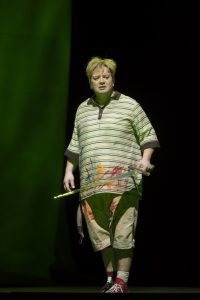 Gone are the beautiful Rhine maidens, terrifying Valkyries, and mysterious Norns. Of the Nibelungs, two. Of the gods, one. The magical elements remain: Wotan’s spear, the Ring, the Tarnhelm, and the sword Nothung. A forest bird and the boy Siegfried are the only new characters. And what a naive and precocious boy he is.
Gone are the beautiful Rhine maidens, terrifying Valkyries, and mysterious Norns. Of the Nibelungs, two. Of the gods, one. The magical elements remain: Wotan’s spear, the Ring, the Tarnhelm, and the sword Nothung. A forest bird and the boy Siegfried are the only new characters. And what a naive and precocious boy he is.
Siegfried opens with the dwarf Mime trying unsuccessfully to forge a sword for the boy. Acting on a tip from Wotan in the guise of a wanderer, Siegfried himself forges Nothung and heads off to the forest to fight the giant Fafner who has turned himself into a dragon. On the way, Siegfried tries to communicate with a forest bird, but only after he has killed the dragon and tasted its blood is he able to understand. With the Ring and Tarnhelm in hand, our impulsive hero kills Mime, destroys Wotan’s spear, and follows the bird to the flaming rock. There he rescues his aunt Brunhilde and immediately the two fall in love.
While some of the sets and costumes will be familiar to those who saw the earlier productions of Das Rheingold and Die Walküre, also directed by David Pountney, Siegfried introduces a new, more fantastical, fairytale-ish ambience not unlike that of Mozart’s Magic Flute. Pountney makes our boy hero seem to be much younger than Wagner intended — a prepubescent boy rather than a young man. Throughout the whole opera he wears shorts and a striped polo. His dwelling looks more like a nursery than a cave, furnished with a crib and decorated with childish crayon drawings. Moreover, Mime wears a dress and long hair, as if he was Siegfried’s nurse.
 The childishness of it all is underscored by the extra large size of the props. Siegfried’s own diminutive height and that of his dwarf guardian is put in perspective by Wotan’s presence, who in Acts I and II walks on stilts. As Wotan walks without them in Act III, are we to presume that Siegfried has suddenly grown into a man?
The childishness of it all is underscored by the extra large size of the props. Siegfried’s own diminutive height and that of his dwarf guardian is put in perspective by Wotan’s presence, who in Acts I and II walks on stilts. As Wotan walks without them in Act III, are we to presume that Siegfried has suddenly grown into a man?
And the fantasy goes on as we see the forest bird first flown around the stage like a kite by an actor, then played by Diana Newman from Wotan’s lair in the sky. The dragon, blown-up like a massive pool toy, hardly seems threatening at all when compared to the brother dwarves who want to kill Siegfried and take the Ring for themselves. A boy unpracticed in the art of swordplay, Siegfried easily dispatches Fafner with a single thrust. German tenor Burkhard Fritz in his American debut plays the hero more with insouciance than with innocence.
I really wanted to find a reason not to like Pountney’s direction, but in the end I had to admit that it mostly worked, except for the final love scene, of course. But that’s difficult to swallow for another reason: incest. In general, there is a fair amount of continuity with the earlier productions of Das Rheingold and Die Walküre, a continuity that extends beyond sets and costumes to the principal roles.
Three out of the eight reprise earlier roles, including Eric Owens as Wotan, Christine Goerke as Brunhilde, and Samuel Youn as Alberich. All three are and have been consistently brilliant in their roles. It is well worth the more than four hour wait, for example, to hear Goerke’s Brunhilde sing “Heil dir, Sonne!” in the third act.
Two recurring parts not filled by their earlier soloists are those of Erda, this time played by Ronnita Miller, and Mime, played by Matthias Klink — both making their Lyric Opera debuts. Klink’s Mime is perhaps my favorite in this production. He brings an extraordinary amount of intensity to the role, from his manic stage presence to his perfect tone and diction. It all stands in stark contrast to Fritz’s Siegfried, who almost seems dull by comparison. But the fact that Fritz is making his role debut as the boy hero and remains on stage nearly the entire four hours shows impressive stamina and is quite a remarkable achievement.
photos by Todd Rosenberg
Siegfried
Lyric Opera of Chicago
Civic Opera House, 20 N. Wacker Drive
ends on November 16, 2018
for tickets, call 312.827.5600 or visit Lyric Opera
for more shows, visit Theatre in Chicago
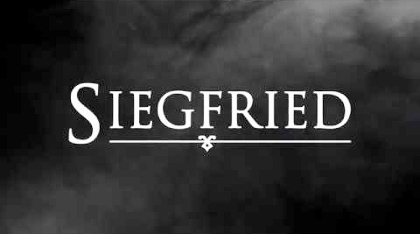
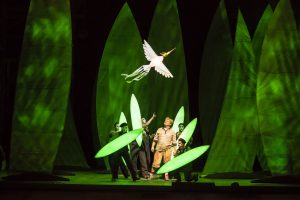

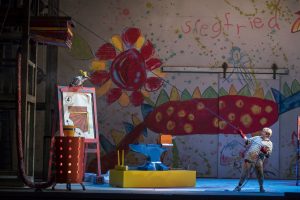
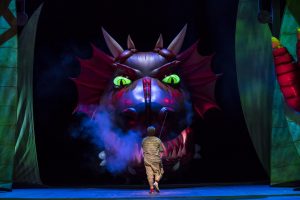
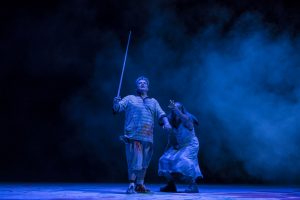
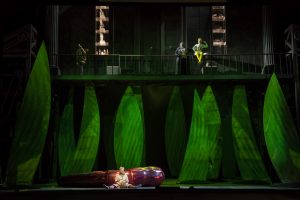


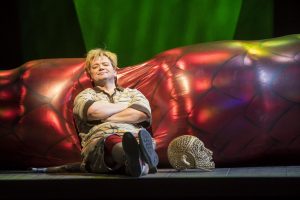
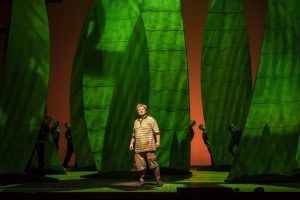

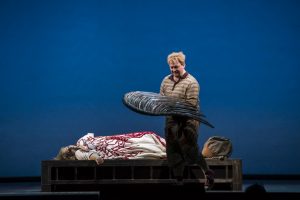
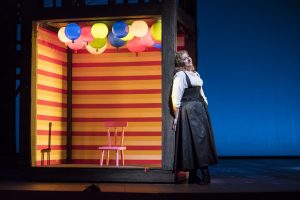
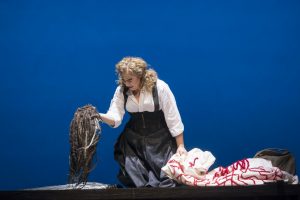
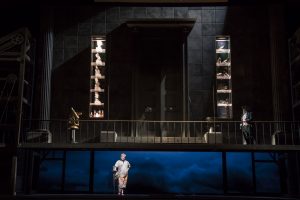
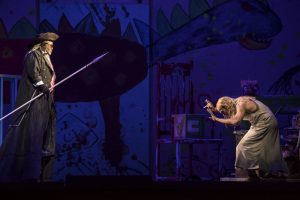
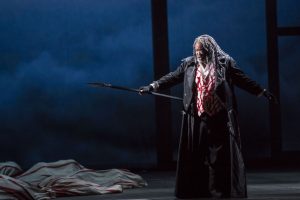
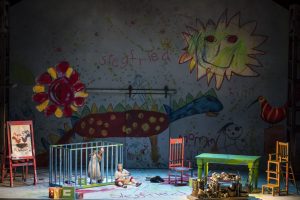
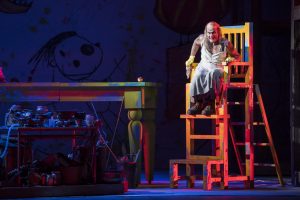
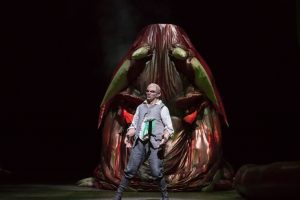
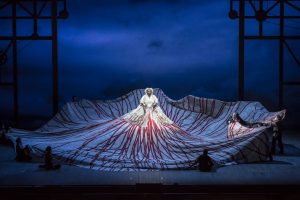
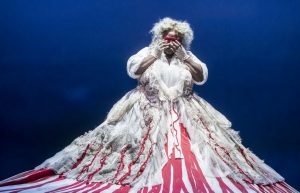
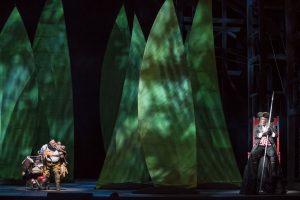
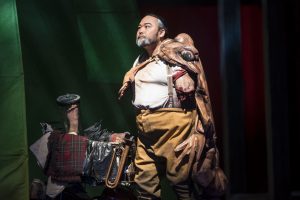

{ 1 comment… read it below or add one }
I almost broke out with laughter during the seduction just because of the incongruity. Siegfried trying to sing about his lust clothed in baby pants and desiring incest was a bit much. Perhaps the blood on his hands and understanding the bird could have been better staged (using 2 birds) to imply innocence being lost before this last scene. Taking Wotan off stilts doesn’t work as an explanation or development as it is not in the Siegfried characterization. Maybe I’m picky but something was left out of the creative process that made a comedy out of the entire production. A few minor changes and it would be a powerhouse.